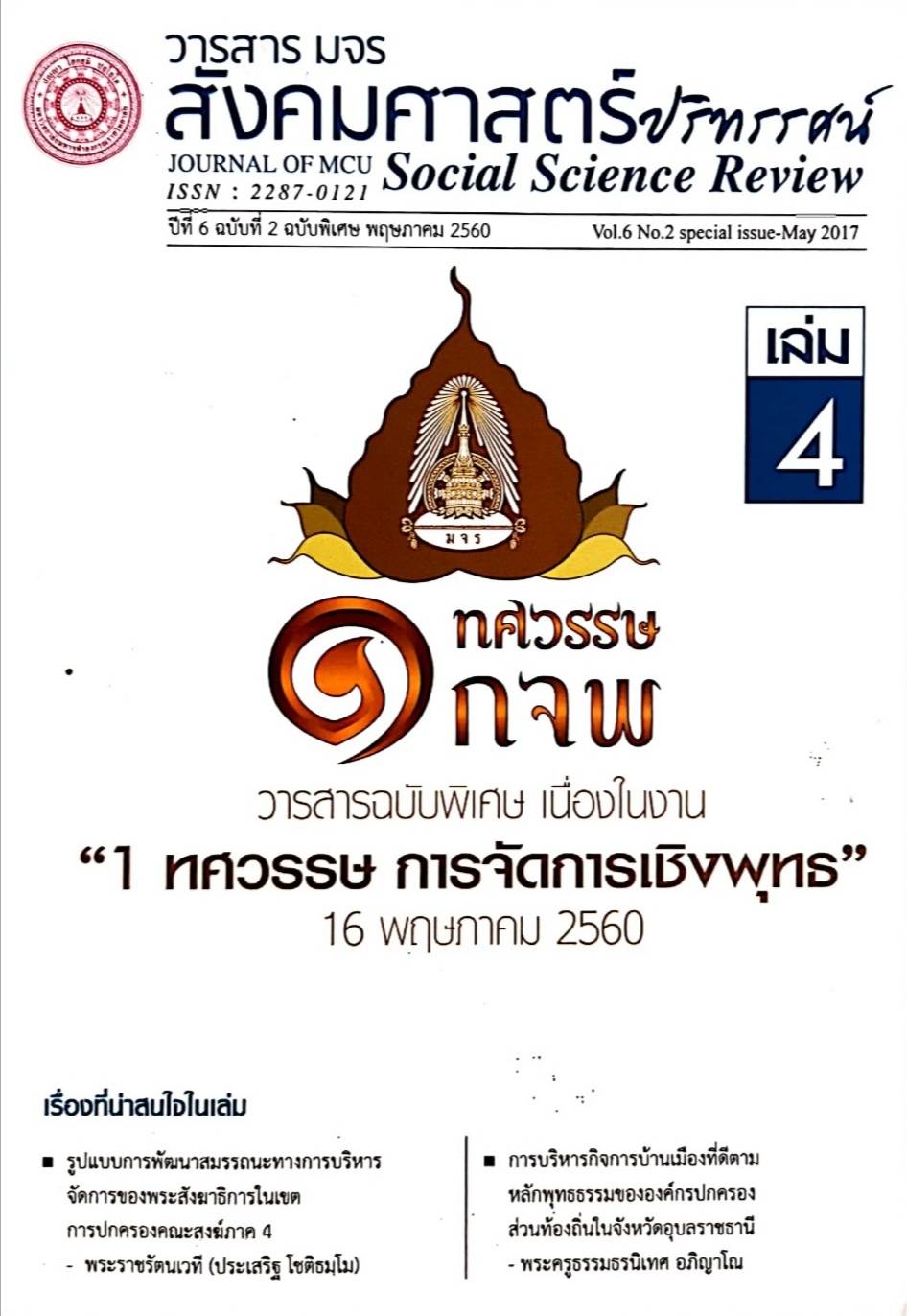การสร้างภูมิคุ้มกันการเสพติดอินเทอร์เน็ตตามหลักอริยสัจ 4
คำสำคัญ:
จิตวิเคราะห์; ทฤษฎีเสริมแรง; พระพุทธศาสนาบทคัดย่อ
พฤติกรรมเสพติดอินเทอร์เน็ตสามารถอธิบายได้ตามแนวคิดจิตวิเคราะห์หรือทฤษฏี
เสริมแรง ซึ่งส่งผลต่อวิธีบาบัดรักษาอาการที่เป็นไปแบบแยกส่วนด้วยวิธีจิตบาบัดหรือปรับ
พฤติกรรม ซึ่งวิธีการที่มาจากรากฐานแนวคิดจิตวิทยายังคงเกิดพฤติกรรมกลับไปเสพติดซ้า ในขณะ
ที่พฤติกรรมเสพติดอินเทอร์เน็ตตามแนวคิดพระพุทธศาสนาอธิบายได้ว่า เป็นเพียงทุกข์รูปแบบหนึ่ง
ของชีวิตตามหลักอริยสัจ 4 ซึ่งมีสาเหตุหลักจากตัณหาในจิตใจและสภาพสังคมที่ขาดกัลยาณมิตร
เป็นปัจจัยร่วม ซึ่งเป็นมุมมองแบบภาพรวม แนวทางแก้ไขปัญหาใช้สัมมาทิฏฐิอันมีปัจจัยเกิด 2
ประการ ได้แก่ โยนิโสมนสิการเป็นฐานสร้างสติและปัญญาภายในจิตบุคคลเพื่อลดละตัณหาโดยตรง
และกัลยาณมิตรสร้างสังคมสิ่งแวดล้อมการใช้อินเทอร์เน็ตที่พึงประสงค์อันเป็นปัจจัยภายนอก
ดังนั้นบุคคลและสังคมจึงมีภูมิคุ้มกันการใช้อินเทอร์เน็ตด้วยปัญญารู้เท่าทันโดยไม่ต้องหลีกเลี่ยงหรือ
ตัดขาดจากอินเทอร์เน็ต จึงเป็นแนวทางที่สามารถใช้ทั้งแก้ไขและปูองกันพฤติกรรมเสพติด
อินเทอร์เน็ตอย่างถาวร
เอกสารอ้างอิง
สานักงานสถิติแห่งชาติ. (2556). สารวจการมีการใช้เทคโนโลยีสารสนเทศและการสื่อสารใน
ครัวเรือน พ.ศ.2555. กรุงเทพมหานคร: สานักสถิติเศรษฐกิจและสังคม.
ธนิกานต์ มาฆะศิรานนท์. (2545). พฤติกรรมการเสพติดอินเทอร์เน็ตและปัจจัยที่มีความสัมพันธ์กับ
การเสพติดอินเทอร์เน็ตของผู้ใช้อินเทอร์เน็ตประเทศไทย. วิทยานิพนธ์นิเทศศาตรมหาบัณฑิต. สาขาวิชาวารสารสนเทศ. คณะนิเทศศาสตร์.บัณฑิตวิทยาลัย: จุฬาลงกรณ์
มหาวิทยาลัย.
ประพิมพ์พรรณ สุวรรณกูฏ และอัจศรา ประเสริฐสิน. (2552). ผลกระทบของอินเตอร์เน็ตต่อ
สุขภาพกาย และสุขภาพจิตของเด็กและเยาวชนไทย: กรณีศึกษากรุงเทพมหานคร.
รายงานการวิจัยกรุงเทพมหานคร: สานักงานคณะกรรมการการวิจัยแห่งชาติ.
พระพรหมคุณาภรณ์ (ป.อ.ปยุตฺโต). (2555). พุทธธรรม ฉบับปรับขยาย. กรุงเทพมหานคร:
สานักพิมพ์ผลิธัม.
American Psychiatric Association. (2013). DIAGNOSTIC AND STATISTICAL MANUAL OF
MENTAL DISORDERS. fifth edition. DSM-5. Arlington. VA: American
Psychiatric.
Kimberly. Young. (1996). Internet Addiction: The Emergence of a New Colincal
Disorder. Cyber Psychology & Behavior. 1(3). 237 - 244.
Kimberly. Young.. Molly. Pistner.. James. O'Mara.. and Jennifer. Buchanan. (2000).
Cyber Disorders: The Mental Health Concern for the New Millennium.
Cyber Psychology & Behavior. 3(5). 475 - 479.
ดาวน์โหลด
เผยแพร่แล้ว
รูปแบบการอ้างอิง
ฉบับ
ประเภทบทความ
สัญญาอนุญาต
ลิขสิทธิ์ (c) 2020 วารสาร มจร สังคมศาสตร์ปริทรรศน์

อนุญาตภายใต้เงื่อนไข Creative Commons Attribution-NonCommercial-NoDerivatives 4.0 International License.
เพื่อให้เป็นไปตามกฎหมายลิขสิทธิ์ ผู้นิพนธ์ทุกท่านต้องลงลายมือชื่อในแบบฟอร์มใบมอบลิขสิทธิ์บทความให้แก่วารสารฯ พร้อมกับบทความต้นฉบับที่ได้แก้ไขครั้งสุดท้าย นอกจากนี้ ผู้นิพนธ์ทุกท่านต้องยืนยันว่าบทความต้นฉบับที่ส่งมาตีพิมพ์นั้น ได้ส่งมาตีพิมพ์เฉพาะในวารสาร มจร สังคมศาสตร์ปริทรรศน์ เพียงแห่งเดียวเท่านั้น หากมีการใช้ภาพหรือตารางหรือเนื้อหาอื่นๆ ของผู้นิพนธ์อื่นที่ปรากฏในสิ่งตีพิมพ์อื่นมาแล้ว ผู้นิพนธ์ต้องขออนุญาตเจ้าของลิขสิทธิ์ก่อน พร้อมทั้งแสดงหนังสือที่ได้รับการยินยอมต่อบรรณาธิการ ก่อนที่บทความจะได้รับการตีพิมพ์ หากไม่เป็นไปตามข้อกำหนดเบื้องต้น ทางวารสารจะถอดบทความของท่านออกโดยไม่มีข้อยกเว้นใดๆ ทั้งสิ้น





